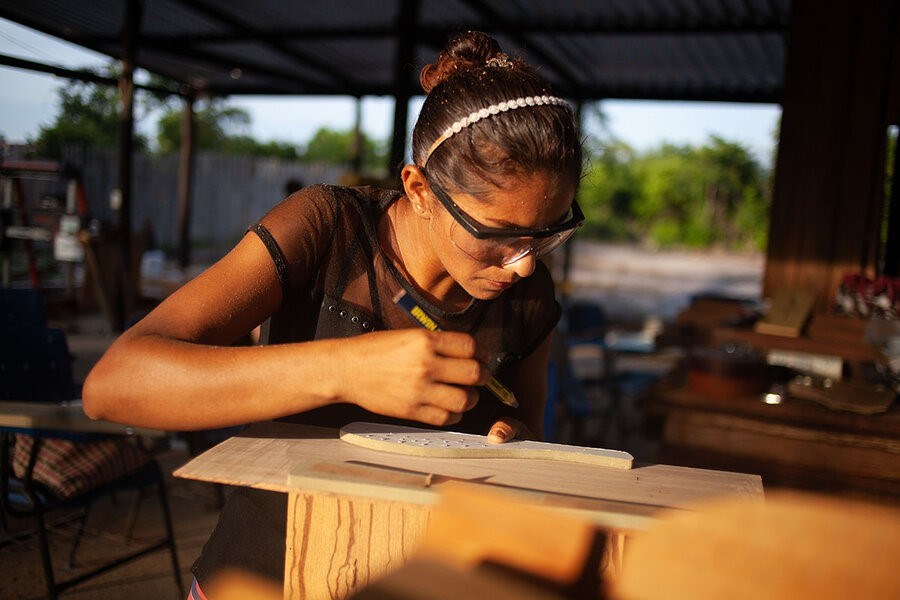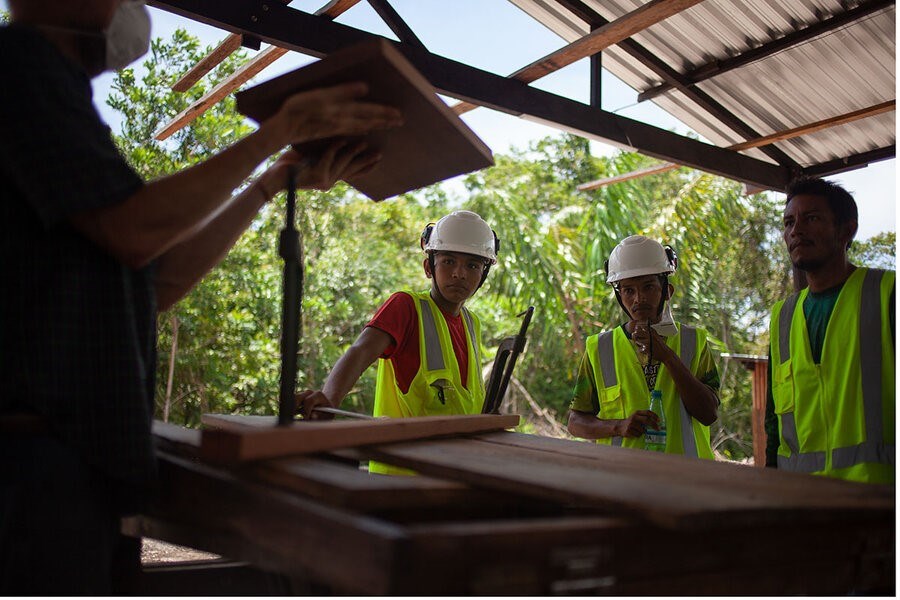 Jackeane dos Santos Leite traces a shape onto a plank of Brazilian oak wood. She is taking part in a workshop that aims to teach residents of villages in the Brazilian Amazon new income-generating skills, such as woodworking. Her village was once an illegal logging hub. Ana Ionova
Jackeane dos Santos Leite traces a shape onto a plank of Brazilian oak wood. She is taking part in a workshop that aims to teach residents of villages in the Brazilian Amazon new income-generating skills, such as woodworking. Her village was once an illegal logging hub. Ana Ionova
November 2, 2021
Jackeane dos Santos Leite leans over a thin plank of wood, her brow furrowed above her plastic goggles. Carefully, she traces the shape of a spatula before powering up a small electric saw.
“I’ve only used this one a few times,” she says through the cloud of sawdust, her hands unsteady as she cuts into the tauari, or Brazilian oak wood. “The shape has to be just right.”
On a scorching afternoon, deep in the Brazilian Amazon, Ms. Leite is learning the art of woodcrafting from a trio of designers from Rio de Janeiro, visiting the riverside village of São Francisco das Chagas do Caribi for the occasion. Wearing hard hats and earmuffs, eight trainees busily cut, carve, sand, and polish wood under the guidance of the experts.
The village is an unlikely setting for a workshop like this. Once an illegal logging hub, the region lost some of its most valued tree varieties a few decades ago, before the authorities turned it into a protected reserve spanning hundreds of thousands of acres.
Now, residents hope the training will help kick-start a new woodworking venture. By making tableware such as platters and spoons from legally harvested timber, they hope to earn income from the forest without destroying it.
“This makes me think of my grandfather,” Ms. Leite says over the rattle of the generator powering the tools. A longtime settler, “he made canoes; he made everything. But things are really different now. We’re doing things legally.”
This tiny victory, on the front lines of the battle to save the Amazon, offers a glimmer of hope as the world scrambles to slash carbon emissions and defuse the climate emergency.
World leaders meeting in Glasgow, Scotland, at the COP26 United Nations climate summit have also taken up the challenge. On Monday they pledged to halt deforestation by 2030, and to spend $19 billion on the effort, including on projects, much like the woodworking venture here, that “enhance rural livelihoods ... through ... recognition of the multiple values of forests.”
Pledges are just pledges, though, and a similar international agreement in 2014 has had little impact. And for all the hard-fought efforts of Ms. Leite and her neighbors, swaths of the Brazilian Amazon are still being cleared and burned at a breakneck pace. Deforestation has hit its highest level in a decade, pushing Brazil’s emissions up 9.6% in 2020, even as the pandemic froze economies and triggered a short-lived emissions dip elsewhere in the world, a new report shows.
 Ana ion ovaTrainees learn the art of woodcrafting at a workshop in the village of São Francisco das Chagas do Caribi, in Brazil’s Amazon. The workshop, held by three designers from Rio de Janeiro, is part of an initiative to help communities in the reserve build new, sustainable income streams that don’t rely on forest destruction.
Ana ion ovaTrainees learn the art of woodcrafting at a workshop in the village of São Francisco das Chagas do Caribi, in Brazil’s Amazon. The workshop, held by three designers from Rio de Janeiro, is part of an initiative to help communities in the reserve build new, sustainable income streams that don’t rely on forest destruction.
Often dubbed the “lungs of the planet,” the Amazon is one of the world’s most important carbon sinks, absorbing about 2 billion metric tons of CO2 per year. But parts of it now emit more carbon than they capture, and scientists warn the rainforest is coming dangerously close to a tipping point at which it will turn into a savanna, with devastating results for the climate, locally and globally.
Many blame President Jair Bolsonaro, who has hitherto defied all global calls to curb deforestation while gutting Brazil’s environmental agencies. Under his watch, fines for environmental crimes fell to their lowest in over two decades. Mr. Bolsonaro has also vowed to open up protected forests and Indigenous lands to exploitation, which his critics say has emboldened cattle ranchers, wildcat miners, and land-grabbers.
“There's a total lack of environmental control,” says Rômulo Batista, a campaigner for Greenpeace Brazil. “And the government has done little to stop it. In fact, it has undertaken a project to dismantle Brazil’s environmental policies.”
Against this backdrop, many observers remain skeptical of Mr. Bolsonaro’s promises and Brazil's signature on yesterday’s COP26 deal. “He is giving speeches, trying to make the world believe that he’s taking action,” Mr. Batista adds. “But there is nothing to back these promises.”
Page created on 11/5/2021 4:48:38 PM
Last edited 11/5/2021 5:07:31 PM
